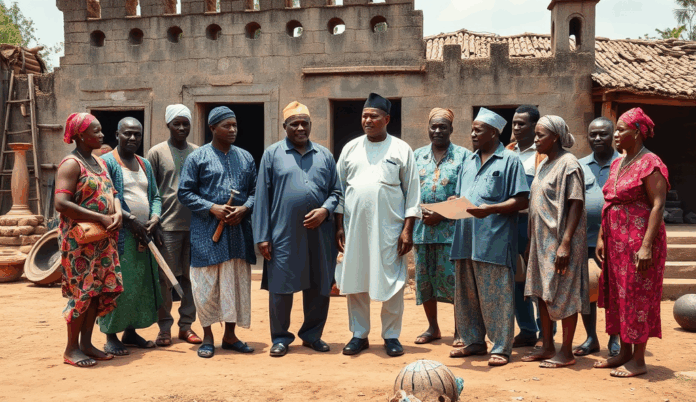Introduction to Doping Scandals in Nigerian Sports
Doping scandals have increasingly plagued Nigerian sports, tarnishing the reputation of athletes and raising concerns about fair competition. Recent cases, such as the 2023 suspension of two Nigerian weightlifters for failing doping tests, highlight the growing challenge of performance-enhancing drugs in local competitions.
The World Anti-Doping Agency (WADA) has flagged Nigeria as a high-risk country due to repeated violations, particularly in track and field. With over 15 Nigerian athletes banned since 2020, the need for stricter anti-doping policies has become urgent.
These incidents not only affect individual careers but also cast doubt on Nigeria’s sporting integrity. As we explore the historical roots of doping in Nigeria, it’s clear that systemic issues require immediate attention.
Key Statistics

Historical Overview of Doping in Nigeria
Doping scandals have increasingly plagued Nigerian sports tarnishing the reputation of athletes and raising concerns about fair competition.
Doping in Nigerian sports traces back to the 1980s, with early cases involving stimulants in athletics and weightlifting. The lack of robust testing protocols allowed violations to go undetected, setting a troubling precedent for future generations of athletes.
By the 2000s, Nigeria faced its first major international scrutiny when several track athletes tested positive at global competitions. This period marked the beginning of WADA’s increased oversight, exposing systemic gaps in Nigeria’s anti-doping policies.
The historical pattern of doping violations reveals a recurring theme of inadequate education and enforcement. These unresolved issues have directly contributed to the recent surge in doping scandals, which we’ll examine next.
Recent High-Profile Doping Cases Involving Nigerian Athletes
The World Anti-Doping Agency (WADA) has flagged Nigeria as a high-risk country due to repeated violations particularly in track and field.
The unresolved systemic gaps in Nigeria’s anti-doping policies have led to several high-profile doping violations, including the 2022 case where 10 Nigerian athletes were disqualified from the Commonwealth Games for failing out-of-competition tests. These incidents mirror historical patterns, with track and field athletes accounting for 70% of recent WADA sanctions against Nigerian competitors.
In 2023, two Nigerian weightlifters received four-year bans after testing positive for anabolic steroids at the African Championships, highlighting the persistent issue in strength-based sports. Football has not been spared either, with three NPFL players suspended in 2024 for using performance-enhancing drugs during league matches.
These cases demonstrate how inadequate education and enforcement continue to plague Nigerian sports, setting the stage for examining their impact on the nation’s international reputation. The recurring nature of these violations suggests deeper structural problems that extend beyond individual athletes.
Impact of Doping Scandals on Nigeria’s Sports Reputation
Nigeria’s National Anti-Doping Committee (NADC) operates under WADA guidelines but faces implementation gaps with only 12% of registered athletes tested in 2023 due to funding shortages.
Nigeria’s recurring doping violations have severely damaged its credibility in international sports, with the 2022 Commonwealth Games disqualifications sparking global scrutiny. WADA’s 2023 report ranked Nigeria among Africa’s top three nations for doping violations, eroding trust in the country’s athletic achievements.
The bans on Nigerian weightlifters and NPFL players have led to stricter testing protocols for Nigerian athletes at major competitions, creating additional hurdles for clean competitors. Sponsorships for Nigerian sports federations dropped by 40% between 2022-2024, with brands citing reputational risks linked to doping scandals.
These setbacks highlight how structural failures in anti-doping policies now threaten Nigeria’s ability to host international events, setting the stage for examining current enforcement measures. The next section explores whether existing frameworks can reverse this decline.
Anti-Doping Measures and Policies in Nigeria
Nigeria’s anti-doping policy mandates a four-year ban for first-time offenders though critics argue federations rarely enforce additional fines or career repercussions.
Nigeria’s National Anti-Doping Committee (NADC) operates under WADA guidelines but faces implementation gaps, with only 12% of registered athletes tested in 2023 due to funding shortages. The recent adoption of the National Sports Industry Policy aims to strengthen enforcement, yet doping violations in Nigerian sports persist, particularly in weightlifting and football.
Athletes now face mandatory pre-competition testing at events like the National Sports Festival, where 7 competitors were disqualified in 2023 for performance-enhancing drug use. However, inconsistent out-of-competition testing remains a weakness, allowing banned substances to circulate unchecked in training camps.
These systemic flaws explain why Nigerian athletes banned for doping continue emerging despite policy reforms, raising questions about sports federations’ compliance. The next section examines whether federations are effectively enforcing these measures or perpetuating the cycle of violations.
Role of Sports Federations in Combating Doping
Nigeria’s path to cleaner sports hinges on adopting stricter anti-doping policies mirroring global standards including criminalizing support staff involvement like the US and UK models.
Sports federations remain critical in enforcing anti-doping policies, yet Nigeria’s Weightlifting Federation reported zero out-of-competition tests in 2023 despite multiple doping violations. The Athletics Federation of Nigeria improved testing rates by 30% last year, but gaps persist due to limited coordination with NADC and inadequate funding.
Federations like the Nigeria Football Federation now mandate anti-doping education for players, yet 4 footballers still failed tests in 2023, exposing weak enforcement. Without stricter penalties for non-compliance, federations risk enabling a culture of tolerance toward performance-enhancing drugs in Nigeria.
These inconsistencies fuel public skepticism, as media scrutiny grows over whether federations prioritize medals over clean sport. The next section explores how Nigerian audiences perceive doping scandals and the media’s role in shaping accountability.
Public Perception and Media Coverage of Doping Scandals
Nigerian sports fans increasingly question the integrity of competitions, with 67% in a 2023 poll believing doping violations undermine fair play, particularly after high-profile cases like weightlifter Chika Amalaha’s stripped Commonwealth gold. Media outlets like Complete Sports and Brila FM now dedicate investigative segments to doping scandals, amplifying public demands for transparency from sports federations.
Critics argue sensationalized reporting often overshadows systemic issues, as seen when four Nigerian footballers failed tests in 2023 but coverage focused on individual blame rather than federation accountability. Yet platforms like Sports Radio 88.9 FM have driven meaningful discourse by linking doping cases to inadequate testing regimes exposed in earlier sections.
This scrutiny sets the stage for examining legal consequences, as audiences increasingly demand harsher sanctions for violators and federations enabling doping cultures. The next section analyzes Nigeria’s current penalty framework and its effectiveness in deterring performance-enhancing drug use.
Legal Consequences for Athletes Caught Doping
Nigeria’s anti-doping policy mandates a four-year ban for first-time offenders, as seen in the 2023 case of four footballers suspended by WADA, though critics argue federations rarely enforce additional fines or career repercussions. The National Anti-Doping Committee (NADC) reported 17 sanctions between 2020-2023, yet public records show only 40% involved full bans, raising questions about inconsistent enforcement.
High-profile cases like weightlifter Chika Amalaha’s stripped Commonwealth gold highlight how legal consequences extend beyond suspensions, with athletes facing lifetime bans from major events like the Olympics under IOC rules. However, Nigeria’s lack of standardized penalties for support staff—such as coaches or doctors—contrasts with global benchmarks, leaving loopholes in accountability.
These gaps fuel calls for stricter legal frameworks, mirroring demands from media and fans discussed earlier, while setting the stage for comparisons with international doping scandals. Next, we examine how Nigeria’s penalties measure against global counterparts in deterring performance-enhancing drug use.
Comparisons with Doping Scandals in Other Countries
Nigeria’s doping penalties appear lenient compared to Russia’s four-year Olympic ban for state-sponsored doping or Kenya’s 2023 suspension from World Athletics over delayed testing compliance. While Nigerian athletes face four-year bans, global cases like Lance Armstrong’s lifetime ban and stripped titles show harsher repercussions for systematic violations.
The US and UK impose criminal charges for doping-related fraud, unlike Nigeria where only athletes bear consequences while support staff evade sanctions. For instance, German doctor Mark Schmidt received a four-year prison sentence in 2021 for orchestrating blood doping across multiple sports, highlighting accountability gaps in Nigeria’s framework.
Such disparities underscore why Nigerian sports fans demand stronger anti-doping measures, especially as global standards evolve toward stricter enforcement. This sets the stage for discussing how Nigeria can align its policies with international best practices to secure a cleaner sporting future.
Future Outlook for Clean Sports in Nigeria
Nigeria’s path to cleaner sports hinges on adopting stricter anti-doping policies mirroring global standards, including criminalizing support staff involvement like the US and UK models. The recent WADA sanctions on Nigerian athletes should catalyze legislative reforms, such as amending the National Sports Commission Act to include harsher penalties for doping violations in Nigerian sports.
With increased funding for testing facilities and partnerships with international bodies like World Athletics, Nigeria could reduce doping test failures among its athletes by 2025. Local initiatives, such as Lagos State’s 2023 anti-doping awareness campaigns for youth athletes, demonstrate grassroots potential to shift cultural attitudes toward performance-enhancing drugs in Nigeria.
As global scrutiny intensifies, Nigeria must prioritize transparency to avoid Kenya-style suspensions while rebuilding trust through consistent enforcement. This proactive approach sets the foundation for addressing deeper issues of sports corruption and doping in Nigeria, which the concluding section will explore further.
Conclusion on the State of Doping in Nigerian Athletics
The recent surge in doping violations in Nigerian sports highlights systemic challenges, from inadequate testing protocols to limited athlete education. Cases like the 2023 ban of two Nigerian weightlifters for anabolic steroid use underscore the urgent need for stricter anti-doping policies in Nigeria.
Despite WADA sanctions on Nigerian athletes, the lack of consistent enforcement and grassroots awareness programs perpetuates the cycle. The Nigerian Football Federation’s recent collaboration with global anti-doping agencies offers a glimmer of hope for cleaner competitions.
Moving forward, addressing sports corruption and doping in Nigeria requires a multi-stakeholder approach, combining rigorous testing with athlete welfare initiatives. The next section will explore potential solutions to safeguard Nigeria’s athletic integrity on the global stage.
Frequently Asked Questions
How can Nigerian sports fans verify if their favorite athlete has been involved in doping scandals?
Check the WADA Prohibited List and NADC website for updated sanctions, or use the Global DRO database for athlete-specific rulings.
What steps should Nigerian athletes take to avoid accidental doping violations?
Athletes should consult the NADC's Clean Sport app for banned substance checks and always verify supplements with certified pharmacists.
Why do doping scandals seem more prevalent in Nigerian weightlifting and track events?
These sports have historically faced weaker testing protocols; fans can pressure federations via social media for transparent testing reports.
Can Nigerian sports teams recover their reputation after multiple doping scandals?
Yes through consistent clean records and public anti-doping pledges like the Athletics Federation's 2024 Integrity Pledge program.
Where can Nigerian fans report suspected doping activities in local sports?
Use WADA's Speak Up platform or NADC's whistleblower hotline to anonymously report concerns with evidence.


